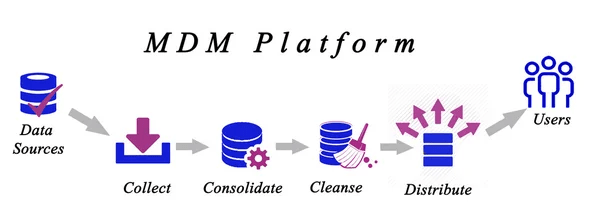What Is Master Data Management ?
Master data management (MDM) is a process that helps you manage all your company’s important information so that it’s accurate, up-to-date, and consistent. It’s a way to bring together all the data that describes your business—its products, services, customers and employees—and make sure it’s standardised so that everyone in the company can use it.
How Does MDM Work ?
Master data management works by defining master records for each of your company’s core entities: products, services, customers and employees. Each master record has identifying attributes (like a product code or customer ID) that are used to reference it throughout the organisation. The master record also includes details about each entity (like product descriptions or employee work histories). Master data management ensures that these records are kept up-to-date across different systems in your organisation so they’re always accurate and consistent.

The Benefits Of Implementing Master Data Management:
There are many benefits to your organisation of using master data management.
First, it improves the efficiency of your business. With master data management, you can find and use the most up-to-date information about your customers, suppliers, and industry partners. This means fewer errors in communication and fewer hours spent searching for the right data.
Second, it allows you to leverage the power of big data by aggregating all of that data into a single place where it can be accessed easily and quickly. This makes it possible to run analytics on any part of your business or customer base in order to identify trends or opportunities for improvement.
Thirdly, it reduces risk by helping you ensure that all of your employees have access to accurate information about their customers and partners at any time. In addition to reducing risk for legal reasons (and saving money), this also allows employees who work with customers directly—such as salespeople or customer service reps—to better serve their clients’ needs more efficiently than ever before.
Here are three more ways MDM may benefit your business:
1. Reduce Costs
2. Improve Customer Satisfaction
3.. Speed Up Product Development
The Role Of MDM In Data Maintenance
Data maintenance is an important part of the master data management process. It involves the creation or updating of business records that are used by multiple departments within the organisation. Data cleansing is another aspect of data maintenance, which refers to the process of correcting errors in business records. These two processes can be done manually or with the help of algorithms such as the one AICA offers.

MDM systems also help organisations maintain consistent definitions of business entities through their lifecycle by providing tools for managing master data. This is achieved by:
* Data governance policies and processes that define how data is captured and managed
* A catalogue of master data sources from which the organisation can select appropriate candidate entities for inclusion in its MDM system
* Tools for capturing and maintaining key attributes about each entity as it moves through its lifecycle
If you don’t have master data management in place, then you’ll end up with a lot of discrepancies between the information coming out of each of these systems. You might be able to see that there were 10 orders placed on your website last month but only 9 were processed through the call centre. Or perhaps you’ll notice that 5 orders were placed through an affiliate network but none were recorded in any other system.
This kind of inconsistency can lead to problems with customer service, as well as with marketing and sales strategies. It can also result in wasted resources when it comes time to report on performance metrics or make decisions about product development or pricing changes.
